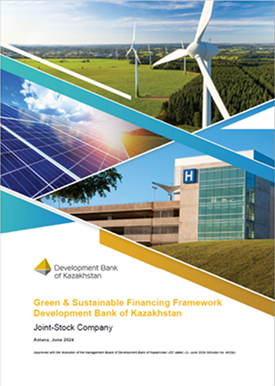
The "Green" and Sustainable financing Framework of the Bank was developed jointly with the Bank’s ESG consultants — CitiBank.


А second-party opinion was received from the international agency Sustainable Fitch, as well as from the Green Finance Center of the Astana International Financial Center.






The Bank actively participates in financing infrastructure projects in the energy sector. For instance, in March 2023, DBK issued debut green bonds worth KZT 10 billion on the Kazakhstan Stock Exchange with a three-year maturity and a floating interest rate of TONIA Compounded +2%. The proceeds from the bond issuance were allocated to financing investment projects, including the reconstruction of 220-500 kV transmission lines at KEGOC branches “Aktyubinskiye MES,” “Sarbaiskiye MES,” “Zapadnye MES,” and the “Strengthening of the Western Zone of Kazakhstan’s power network. Construction of power grid facilities” by providing a bonded loan to KEGOC JSC, which aims to improve the efficiency of the energy system and reliability of power supply in the western regions.
To implement energy efficiency projects, DBK plans to finance Almaty Power Stations JSC in collaboration with the Asian Development Bank and the European Bank for Reconstruction and Development. The funds will be directed towards the modernization of Almaty CHP-2, improving the city’s energy infrastructure, enhancing energy efficiency, reliability, and environmental sustainability. The conversion of CHP-2 from coal to natural gas will reduce greenhouse gas emissions, significantly decreasing the environmental burden.
Furthermore, as part of the energy transition, the Bank actively supports initiatives in the field of renewable energy, as they form the foundation for a shift towards cleaner and more sustainable energy sources.
Currently, approximately 24% of the country’s renewable energy capacity has been developed with the support of the Development Bank of Kazakhstan. The total installed capacity of these projects amounts to 709.8 MW, including 40 MW from hydropower plants, 220 MW from solar power plants, and 449.8 MW from wind farms. A notable example is the implemented project “Construction of the Turgusun Hydropower Plant with a capacity of 24.9 MW in the East Kazakhstan region,” launched with financial support from Development Bank of Kazakhstan JSC. The Turgusun HPP has a positive economic impact by meeting the region’s electricity demand and reducing the electricity deficit by 62 million kilowatt-hours per year.
Investments in renewable energy sources, such as solar and wind power plants, as well as in energy efficiency technologies, are key areas for achieving sustainable development. These investments contribute to reducing carbon emissions, decreasing reliance on fossil fuels, and creating new jobs.
We ensure that a project grievance mechanism is included in all projects or programs financed by the Green Climate Fund. The project grievance mechanism aims to thoroughly assess the problems and resolve the grievances of people affected by the project or program by proposing viable solutions to the problems. In its GCF-financed projects, the Bank aims to receive and resolve grievances from citizens affected by the negative impacts of the project. In case of project or program-related complaints, the Bank and the project implementers can be contacted through the grievance mechanism.
1) by calling the hotline in accordance with the information provided on the Bank's website;
2) by e-mail info@kdb.kz.
3) Through the platform https://eotinish.kz/ru
Complaints related to E&S will be considered by the Client Relations Department, the Technical Analysis Department and the Information and Information Consolidation Department of JSC Development Bank of Kazakhstan. You can send your complaint using the early response form. Before filling out the form, please read the Mechanism for Disclosure of Information and Consideration of Complaints on Climate Projects and Programs Funded by the Green Climate Fund.
Complaints received by e-mail or other bank channels are registered in accordance with the requirements of the Bank's internal acts on documentation and documentation management and are transferred to the bank's management within one working day. The structural unit responsible for considering the complaint, appointed by the management, notifies the applicant of receipt of the complaint within two working days.
Regarding the acceptance of all other types of complaints, please follow the link.

Get a consultation!